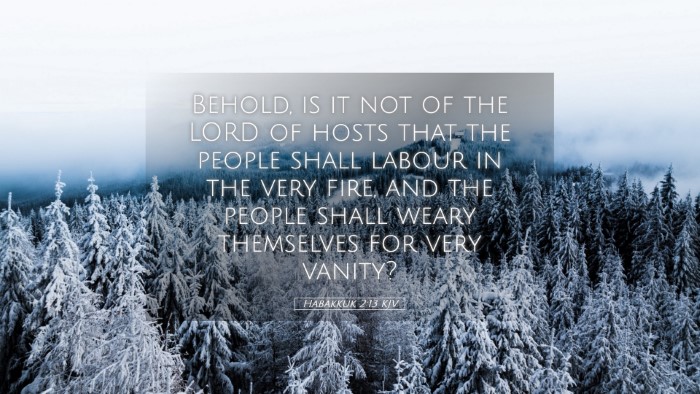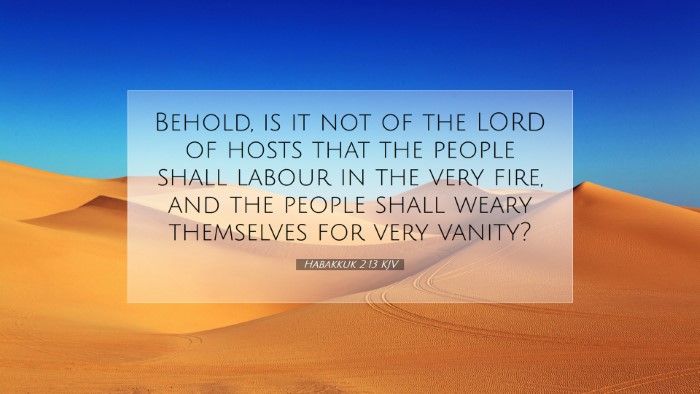Old Testament
Genesis Exodus Leviticus Numbers Deuteronomy Joshua Judges Ruth 1 Samuel 2 Samuel 1 Kings 2 Kings 1 Chronicles 2 Chronicles Ezra Nehemiah Esther Job Psalms Proverbs Ecclesiastes Song of Solomon Isaiah Jeremiah Lamentations Ezekiel Daniel Hosea Joel Amos Obadiah Jonah Micah Nahum Habakkuk Zephaniah Haggai Zechariah MalachiHabakkuk 2:13
Habakkuk 2:13 KJV
Behold, is it not of the LORD of hosts that the people shall labour in the very fire, and the people shall weary themselves for very vanity?
Habakkuk 2:13 Bible Commentary
Commentary on Habakkuk 2:13
Bible Verse: Habakkuk 2:13 - "Behold, is it not of the LORD of hosts that the people labor to feed the fire, and the nations weary themselves for very vanity?"
Introduction
The book of Habakkuk captures the dialogue between the prophet and God regarding the signs of justice, judgment, and the ultimate purpose of God in the face of wickedness. In this particular verse, the prophet is reflecting on the futility of human efforts that are not aligned with the will of God.
Contextual Background
Habakkuk prophesied during a tumultuous period preceding the Babylonian invasion. His concerns regarding the injustice he observed in Judah caused him to question God’s ways. This verse is part of a larger response that emphasizes the vanity of human endeavors when they are detached from divine purpose.
Insights from Public Domain Commentaries
Matthew Henry’s Commentary
Matthew Henry notes that this verse highlights the labor of nations spent on pursuits that yield no lasting benefit. He argues that all human efforts, when divorced from divine intention, result in vanity. Henry emphasizes that the 'fire' could represent the destructive forces unleashed by human folly and that without God’s guidance, these endeavors are ultimately meaningless.
Albert Barnes' Notes on the Bible
Barnes expands on the idea that God is sovereign over the nations. He states that people "labor to feed the fire," which metaphorically suggests that they create turmoil rather than peace when they act outside God’s will. Barnes asserts that the pursuits of nations often lead them to exhaustion and disillusionment, emphasizing that only through obedience to God can true fulfillment be found.
Adam Clarke's Commentary
Adam Clarke examines the term "vanity" in this verse, elucidating that it refers to anything that lacks real value or substance. He contrasts the labor invested in pagan practices with the eternal truths of God's righteousness. Clarke argues that the nations tire themselves out seeking prosperity in acts against God's commandments, which leads nowhere constructive.
Theological Implications
This verse underscores several vital theological themes that are significant for pastors and theologians:
-
The Sovereignty of God:
The verse affirms God's authority over the Earth and the futility of human rebellion against divine order.
-
Human Vanity:
The inherent human tendency towards vanity speaks to the necessity of aligning our goals with God's will to avoid the emptiness of life’s pursuits.
-
Call to Action:
This passage serves as a reminder for believers to engage in endeavors that contribute to God’s kingdom rather than those that merely satisfy personal desires or societal pressures.
Practical Applications
The teachings derived from Habakkuk 2:13 provide critical insights that can be applied in various ministries:
-
Encouragement for Leaders:
Pastors and leaders are called to seek God’s wisdom in their decisions and encourage their congregations to do the same, ensuring that church activities glorify God rather than serve human ambitions.
-
Teaching on Priorities:
This verse illuminates the need for Christians to prioritize their spiritual endeavors and focus on what is eternal, particularly in a world that often emphasizes material success.
-
Exhortation to Prayer:
Prayer should be central in the life of believers, aligning their hearts with God, and should involve pleadings for wisdom in fulfilling God’s work rather than mere personal advancement.
Conclusion
Habakkuk 2:13 serves as a profound reminder of the futility of human efforts disconnected from divine purposes. The insights gathered from esteemed commentaries shed light on the importance of understanding our labor in the context of God's overarching plan. As believers, our pursuits should reflect a devotion to God's sovereignty, aiming for the lasting impact of His kingdom rather than the vanity of our fleeting endeavors.


